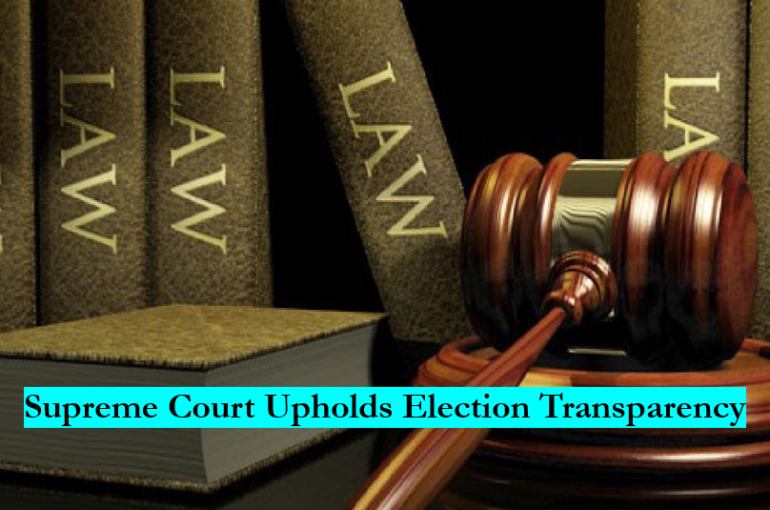SUPREME COURT UPHOLDS ELECTION TRANSPARENCY
Introduction
In a significant legal battle, the Supreme Court of India recently ruled on an election dispute involving Kimneo Haokip Hangshing, an MLA from Manipur in Kimneo Haokip Hangshing Vs. Kenn Raikhan and Ors. in Civil Appeal No. 145 Of 2024 (Arising Out Of Special Leave Petition (C) No. 20580 Of 2023). The case, which brought up serious allegations of asset concealment and corrupt practices, highlights the importance of transparency in election processes and the legal standards governing such disputes.
Background
Kimneo Haokip Hangshing, the Appellant in this case, was elected from the 46-Saikul Assembly Constituency during the 2022 Manipur Legislative Assembly elections. Her victory, however, was challenged by the Respondent, Kenn Raikhan, who had also contested from the same seat. Raikhan filed an Election Petition in the High Court of Manipur, raising concerns about Hangshing’s conduct during the election and alleging violations of Election Laws.
Allegations
- Concealment of Assets: It was alleged that the Appellant had not declared an investment of approximately 2 crore in land development and construction in her nomination papers.
- False Income Declaration: The Respondent claimed that despite serving as a Committee Officer in the Manipur Legislative Assembly Secretariat until December 2021, the Appellant falsely reported her income as 0 for the financial year 2021-2022.
In response to these allegations, the Appellant filed an Application under Order VII Rule 11 of the Code of Civil Procedure (CPC), seeking the dismissal of the Election Petition on the grounds that it did not disclose any cause of action and did not comply with the requirements of Section 83 of the Representation of the People Act, 1951 (RPA). She argued that the Petition lacked specific details about the corrupt practices alleged against her.
The Manipur High Court, however, dismissed the Appellant’s Application, ruling that the issues raised in the Petition required a full trial to determine the truth of the allegations. Aggrieved by this decision, the Appellant appealed to the Supreme Court.
Supreme Court Ruling:
The Supreme Court, in its judgment, upheld the High Court’s decision, stating that the Election Petition did indeed disclose a cause of action and should not be dismissed prematurely. The Court emphasized that under Section 83(1) of the RPA, an Election Petition must provide a concise statement of material facts and particulars of any corrupt practices. While procedural errors may exist, the Court ruled that if there is “substantial compliance” with legal requirements, the petition can proceed.
In its ruling, the Supreme Court noted that the allegations of asset concealment and the inaccurate declaration of income were serious enough to warrant a full trial. The Court also referenced earlier cases, including G.M. Siddeshwar v. Prasanna Kumar (2013) and Thangjam Arunkumar v. Yumkham Erabot Singh (2023), both of which supported the principle that election petitions should not be dismissed if there is substantial compliance with the law, even if some technicalities are missing.
Key Legal Principles:
1] Substantial Compliance: The Court reiterated that in election disputes, the primary concern is whether there has been substantial compliance with the legal requirements. Even if there are minor procedural errors, the case can proceed as long as the petition provides enough material for a trial.
2] Affidavit Requirement: The Court also clarified that while the failure to file an Affidavit under Section 83(1)(c) of the RPA might be considered a procedural defect, it is not sufficient grounds for dismissal if the petition as a whole complies substantially with the legal requirements.
3] Importance of Transparency: The judgments highlight the importance of transparency and full disclosure in election processes, particularly regarding a candidate’s financial disclosures.
Conclusion:
The Supreme Court held that they do not see any reason to interfere with the finding of the High Court of Manipur that the Election Petition discloses a cause of action and that there is substantial compliance of the requirements provided under provisions of RPA and thus the petition cannot be dismissed under Order VII Rule 11 CPC. The Supreme Court’s decision to allow the election petition to proceed signals the judiciary’s commitment to upholding the integrity of the electoral process.
Kartik Khandekar
Senior Associate
The Indian Lawyer & Allied Services





































Leave a Reply